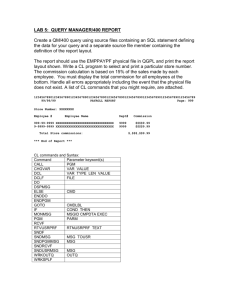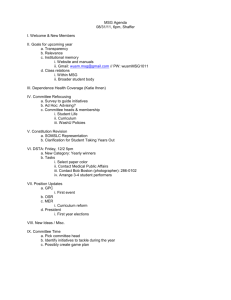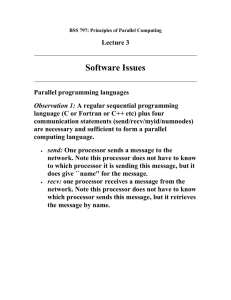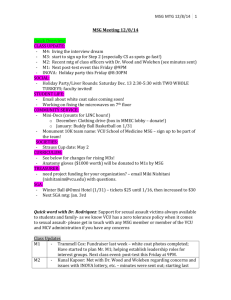to view slide show on the history of MSG!
advertisement
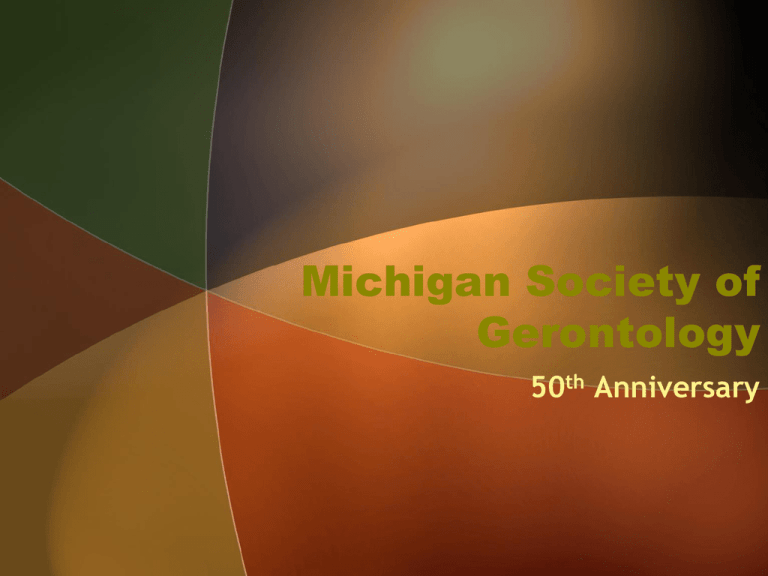
Michigan Society of Gerontology 50th Anniversary MSG Rooted in major historical changes Improved hygiene Advances in healthcare Changing position of women in society Advances in transportation and personal mobility The result • People living longer • Population growing older • Increasing number of older adults needing care • Fewer caregivers • Older adults with few resources struggling to care for themselves • Inadequate long-term care services A “Poor House” A public support system created • Great Depression • Social Security Act of 1935; old-age homes began to be built • Hill-Burton Hospital Survey and Construction Act of 1946 • National Conference on Aging in 1950 The idea for MSG was formed • As early as 1953, Professors from the U of M’s Institute of Gerontology, and others, saw the need for citizens to band together on behalf of older adults • Led by Wilma Donahue, PhD, MSG was founded in 1956 Wilma Donahue, PhD 1900-1993 • The founding meeting was held at the Kellogg Center 56-60 61-65 66-70 71-75 76-80 81-85 86-90 91-95 96-00 01-06 Several early key members of MSG • Wilma Donahue •Jordan Popkin • A. Hazen Price • Frederick Swartz • Minnie Oed • Harry Kelley • Katherine Reebel • Norma Silver • Herbert Rubenstein •Vladimir K. Volk •Charles Odell • Woodrow Hunter • Leonard Gernant How MSG grew • The time was right. The country was recognizing the need to respond to an aging population • The leadership was right. Wilma Donahue and others were experts, activists, connected locally and nationally, as well as tireless recruiters • MSG formed connections with other groups – – – – – – 56-60 Michigan Geriatrics Society Michigan Welfare League Michigan Health Council National Society of Gerontology U of M’s Division of Gerontology The Michigan Commission on Aging 61-65 66-70 71-75 76-80 81-85 86-90 91-95 96-00 01-06 Early MSG activism • 1958: MSG supported Bill 79 to establish a Michigan Commission on Aging. It was established 2 years later • 1959: MSG leaders prepared for the White House Conferences on Aging with a Michigan region study conference • MSG had an active Legislative Committee that met with the MI Commission on Aging to discuss various issues related to policies and resources for the elderly 56-60 61-65 66-70 71-75 76-80 81-85 86-90 91-95 96-00 01-06 Early MSG activism • 1961: MSG members took part in the White House Conference on Aging in Washington, D.C. • 1963: MSG recommended to Governor Romney that the Michigan Commission on Aging become a separate entity. He agreed. 56-60 61-65 66-70 71-75 76-80 81-85 86-90 91-95 96-00 01-06 • 1963: MSG recommended to Gov. Romney that he allocate funds to pilot “County Commissions on Aging”. He agreed. • 1964: Governor's Task Force on Aging was created with MSG support Early MSG: Bridging Policy, Practice and Research • 1965: MSG sponsored a conference on “Better Care of Elderly Patients in Nursing Homes” • 1965: MSG members attended National Conference on Aging in Washington, D.C. Harry J. Kelley witnessed the signing of the Older Americans Act 56-60 61-65 66-70 71-75 76-80 81-85 86-90 91-95 96-00 01-06 Michigan’s influence at the national level 1965: The Older Americans Act is passed. It was introduced in the Senate by Pat McNamara of MI, friend of MSG, who guided it to unanimous approval. Patrick Vincent McNamara 56-60 61-65 66-70 71-75 76-80 81-85 86-90 91-95 96-00 01-06 MSG activism continues • 1966: MSG held a special event explaining federal legislation such as Medicare, Older Americans Act, and the War on Poverty • 1968: MSG recommended to the state that it increase the food budget allowance for the elderly 56-60 61-65 66-70 71-75 76-80 81-85 86-90 91-95 96-00 01-06 MSG: Policy, Practice and Research • 1971: MSG members took part in the state and national White House Conferences on Aging • 1973: MSG formed the Michigan Seniors Coalition. The first event drew 600 delegates 56-60 61-65 66-70 71-75 76-80 81-85 86-90 91-95 96-00 01-06 MSG: Policy, Practice and Research • 1974-75: MSG started a newsletter called “Legislative-News Hotline” which was followed by the 1975 OSA newsletter, “Aging Alert,” still published today • 1976: The Haak-Lilliefors lecture series was established, featuring national leaders in the field • 1977: MSG helped plan OSA’s first annual Senior Power Day, still held in cities across the state 56-60 61-65 66-70 71-75 76-80 81-85 86-90 91-95 96-00 01-06 MSG in the Early 1980s • 1980: MSG sponsored the first combined federal-state public hearing on aging held in Michigan • 1981: MSG members participated in the White House Conference on Aging 56-60 61-65 66-70 71-75 76-80 81-85 86-90 91-95 96-00 01-06 • MSG’s Legislative Committee was disbanded but active political dialogue and relationships continued • Declining membership led to member surveys and ‘soul searching’ to reexamine and reaffirm MSG’s mission • A student section of MSG was started in 1988. By 1990 there were over 100 student members. MSG: 1990 to now • 1993: Letter to Hillary Clinton from MSG President Judith Walters which asked for support of national LTC policy • 2004: Jennifer Mendez, MSG Board member, was appointed to the MI Medicaid LTC Task Force by Governor Granholm • 2005: MSG Members served as Delegates to the White House Conference on Aging MSG: Still Bridging Policy, Practice, and Research • Conferences, forums, or workshops are held annually • MSG awards are presented annually to recognize outstanding practitioners, educators, policy makers and students • MSG now hosts the only statewide listserv dedicated to creating dialogue on aging issues across all arenas The MSG Photo Gallery The 25th Anniversary Celebration, October 28, 1982, Kellogg Center, East Lansing, MI Larry Murray, MSG President 1981-1983 Gordon Hannah, MSG President 1980-81 Katherine Kumkoski, MSG President 1975-76 Harry Wolf Richard Colwell, MSG President 1976-77 MSG 28th Annual Meeting John Schonenberg Beryl Zinn Judy Hollister David Dekker, MSG President 1979-80 Maurice Beck, MSG President 1983-85 Stewart White Mary Ablan Rev. Josephine Morgan Christine Hennessey Wilma Donahue “I believe no state deserves more credit for stimulating and realizing the new legislation than does Michigan. Your own Society, perhaps the foremost in the country, has contributed greatly to an understanding of the needs and aspirations of Michigan’s older people…” Jay B. Constantine, Research Director of the U.S. Senate Special Committee on Aging, 1965

